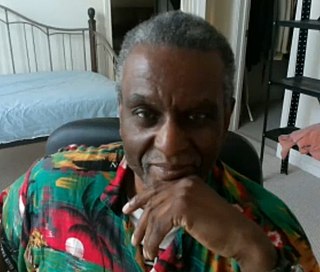A Quote by David Oyelowo
I truly believe slavery is why, as a by-product, we still have a disproportionate amount of black men incarcerated in America. It is an extension of that legacy, and that's not going to start to diminish until black people have a new sense of themselves that isn't tied to slavery and feeling inferior. I think the church can be instrumental in that, in terms of repentance, reconciliation and just being more embracing of each other - not just on Sunday, but in life generally.
Quote Topics
America
Amount
Being
Believe
Black
Black People
By-Product
Church
Diminish
Disproportionate
Each
Embracing
Extension
Feeling
Generally
Going
Inferior
Instrumental
Just
Just Be
Just Being
Legacy
Life
Men
More
New
Other
People
Product
Reconciliation
Repentance
Sense
Slavery
Start
Still
Sunday
Terms
Themselves
Think
Tied
Truly
Until
Why
Related Quotes
I truly believe slavery is why, as a by-product, we still have a disproportionate amount of black men incarcerated in the USA. It is an extension of that legacy, and that's not going to start to diminish until black people have a new sense of themselves that isn't tied to slavery and feeling inferior. I think the church can be instrumental in that, in terms of repentance, reconciliation and just being more embracing of each other - not just on Sunday, but in life generally.
I truly believe that one of the things that has been lacking in America is a spirit of repentance about the injustices of slavery and the injustices of segregation and racism generally. I truly believe that we cannot come to a place of reconciliation until there is individual repentance and corporate repentance.
In the era of slavery, you could be a so-called Afro-Cuban one day and a so-called Black American the next day, or vice versa. I mean there was all this back and forth, and there was a lot of opposition in Black America to slavery in Cuba in particular, because slavery in Cuba lasted until the 1880s.
I wanted to make sure the focus [in The Land] was on human beings themselves and their decisions, but still connected to the urban environment that people associate as being black. I think I was able to make a film without commenting on "black this or black that" and you still feel the presence of it. There's no one character who's saying "we're all black and we're all in this struggle." It's that you just feel it. Some of that is because we get the sense from a lot of independent films that black people struggle all the time.
The U.S. has the largest prison population in the world: two million people. One out of every eight prisoners in the world is an African American. We are warehousing people as a profit to shareholders or for benefits to communities that get to host federal prisons. It is modern slavery. The whole future of America's black community is at risk. One out of every three young black men in Washington, D.C., is under one arm or the other of the criminal justice system. These are the continuing consequences of slavery.
The true story is that black people need to tell their history. Very few films are made by black people about slavery. That itself is a crime because slavery is a very important historical event that has held our people hostage. Forget white people's role in it. In the end what's important is black people remain and live with the scars and psychological issues.
Since I have escaped the harshness of the economic bounds of poverty, I have stayed very connected to it spiritually. I reside and live and go and socialize and exist among those who suffer daily from the relationship that they have to poverty, Black men and women who are incarcerated. Actually, all people who are incarcerated, not just Black.
Black History is enjoying the life of our ancestors who paved the way for every African-American. No matter what color you are, the history of Blacks affected everyone; that's why we should cherish and respect Black history. Black history changed America and is continuing to change and shape our country. Black history is about everyone coming together to better themselves and America. Black history is being comfortable in your own skin no matter what color you are. Black history makes me proud of where I came from and where I am going in life.

































